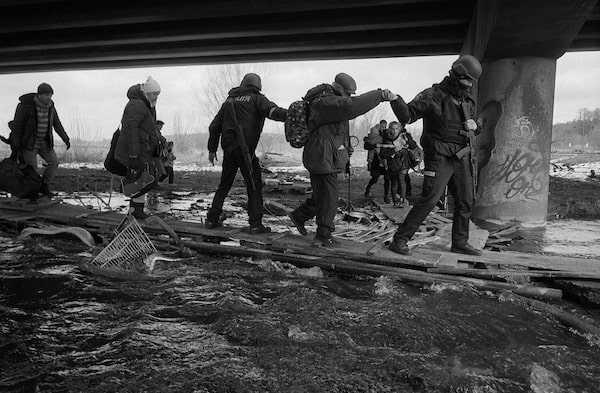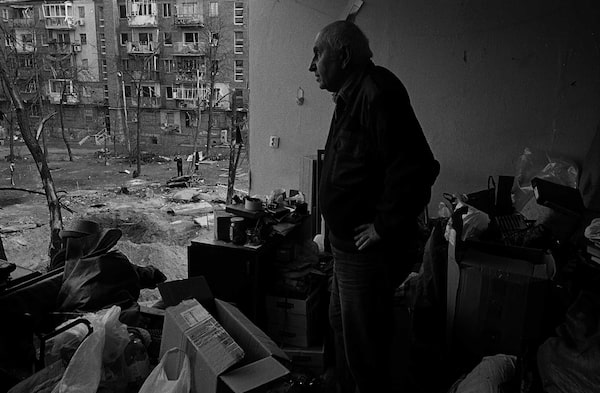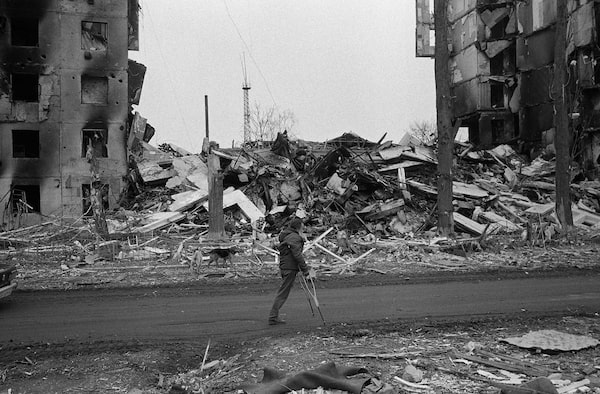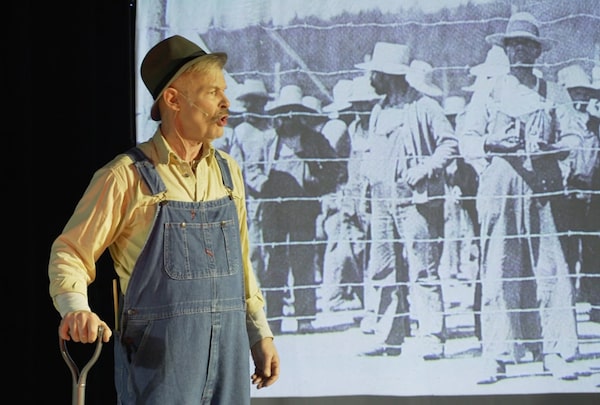
Ukrainian civilians get help crossing a war-ravaged landscape in a photo in Alexander Glyadyelov: Gathering Darkness, which runs at the Polygon Gallery in North Vancouver until July 3.Alexander Glyadyelov
The sun was shining, smiling people were strolling along the North Vancouver waterfront. Across the sparkling Burrard Inlet, the cruise ships were in. On a beautiful Saturday, it felt like life was returning to a new sort of normal.
This was the scene behind me, outside the large plate glass windows of the Polygon Gallery’s main floor. What was in front of me was an entirely different kind of new normal, a horrific one, for the people of Ukraine.
The photographs in the exhibition Alexander Glyadyelov: Gathering Darkness (at the Polygon until July 3) are unflinching. A weighted sheet covers a mass grave in a Kyiv suburb. A man unable to cross a destroyed bridge is carried over a river in a sling. A body lies in a doorway of a house; the woman had stayed in Bucha to take care of her ill, elderly sister. She was shot on the threshold of her own house, the exhibition’s materials explain. Her sister, starved and dehydrated, died inside.
Excruciating. But a necessary disturbance.

Alexander Glyadyelov

Glyadyelov' photos put the focus on Ukrainian citizens, humanizing the war.Alexander Glyadyelov
Alexander Glyadyelov is a Polish-born Ukrainian photographer who has been documenting Russia’s military aggression toward Ukraine since 2014. Using film, he has been photographing virtually daily since the February invasion, developing the photos each evening and sending scans out to people he knows around the world. His goddaughter, Liliya Syvytska, who is studying film at the University of British Columbia, brought them to the attention of the Polygon.
Curator Elliott Ramsey immediately saw the opportunity to show work depicting an event not in hindsight, but as it’s happening – and in such an intimate way.
“When we look at the genre of war photography, so often it’s an international photojournalist being flown into a war zone that really has nothing to do with their own home, their own people that they know, their country. It’s very much an outsider perspective. And indeed that has been the case in Alexander’s own career at various times,” says Ramsey. “And yet for this, Alexander is a citizen; he is on the ground, he’s sharing in that experience.”
The photos focus on citizens, humanizing the war. In one, neighbours have tea by candle-light at the bottom of a stairwell, a safer place during bombing than their apartments. In another, a man looks out from his destroyed apartment in Kyiv; the walls to the world are gone.
“So many of the images we see in our media cover the highlights, the aftermath of battles, or scenes of destruction or aggression,” says Ramsey. “And I think Alexander really captures those poignant and significant moments in between and underneath.”
Looking at the images, I found it hard to compute that people were behind me, strolling with their ice creams and specialty coffees. That we are all just living here, as this is happening there.
This unsettling feeling is a recurring theme in a new Canadian poetry anthology. Poems in Response to Peril: An Anthology in Support of Ukraine was put together in less than three months by London, Ont.-based poet Penn Kemp and Richard-Yves Sitoski, who is poet laureate for Owen Sound, Ont.
In February on her blog, Kemp asked poets to respond to W.H. Auden’s famous quote (from his elegy for W.B. Yeats) that “poetry makes nothing happen.” Then she put out a call on social media. Dozens of poems came in, many of which appear in the anthology.
Some deal with that feeling of impotence, going on with life in Canada as war raged, such as Tanis MacDonald’s We lived Canadianly during the war. “We were unhappy during the war because our bandwidth was / low. Gas prices were up, and we were tired of masking,” it begins. “And when they bombed other people’s houses, we knew to / sigh and look sad.”
Kemp relates deeply to this feeling of powerlessness and frustration, but as for Auden’s provocation, she believes poetry can be an effective tool.
“It moves the heart,” she says. “And when the heart is moved, then action follows.”
The anthology’s first printing has sold out, raising about $4,000 for PEN Ukraine. A second printing is underway. Contributors have sent copies of the book to Ukrainian poets. And poets have been making videos of themselves reading their poems.

Montreal playwright/performer Norman Nawrocki brings to light the incarceration of Ukrainian-Canadian immigrants during the First World War in his work Run Nawrocki Run! Escape from Banff Prison.Joyce Valbuena/Handout
Another new work of art available online documents a shameful, but not widely known, event in Canadian history. In his multimedia theatre piece Run Nawrocki Run! Escape from Banff Prison, playwright/actor/musician Norman Nawrocki recounts the internment of Ukrainian-Canadians during the First World War.
Ukrainians, invited to Canada to live and work, were declared enemy aliens in 1914, when war began. Thousands were sent to camps where they became forced labourers under horrible conditions.
“Overnight, everything changes. From ‘welcome to Canada, boys.’ To ‘Ukrainian scum, traitors, enemies,” Nestor, played by Norman Nawrocki, says in the play.
Nestor is a composite of three men whom Norman thinks were his distant relatives, based on research he conducted. One escaped his camp, the other two did not. Their fates are unknown.
“I wanted to focus on what does it take to make someone get out of an intolerable situation. Where do you find the courage? What illuminates that smouldering spirit of rebellion that’s in all of us?,” says Nawrocki, who was born in Vancouver and lives in Montreal, where the piece was recorded last November.
“Much like in Ukraine today. The Ukrainians are up against incredible odds. And yet, people are underlining the courage it must take to fight under those circumstances.”
The performance can be screened online June 20-July 4.
Nawrocki is accepting donations for the Fundacja Folkowisko Foundation, which offers assistance to Ukrainian refugees in Poland.
Beyond raising money, Nawrocki says art has an important role to play. “Through music, through visual art, through theatre, through dance, through story, if we can remind people of this important history so we can learn from it and not repeat the same mistakes, the same violations of human rights,” he says. “That’s a huge contribution.”
The Polygon exhibition, which is also free, is collecting donations for the Maple Hope Foundation’s relief efforts in Ukraine.
Glyadyelov joined the May opening event at the Polygon by Zoom from Ukraine, where he spoke about some of the horrors he is witnessing. He told the story of visiting a makeshift morgue in an old village house, seeing a dead soldier there. The soldier’s belongings were packed up in a plastic bag next to him, including a mobile phone. It “was ringing and ringing,” Glyadyelov said.
Sign up for The Globe’s arts and lifestyle newsletters for more news, columns and advice in your inbox.
 Marsha Lederman
Marsha Lederman